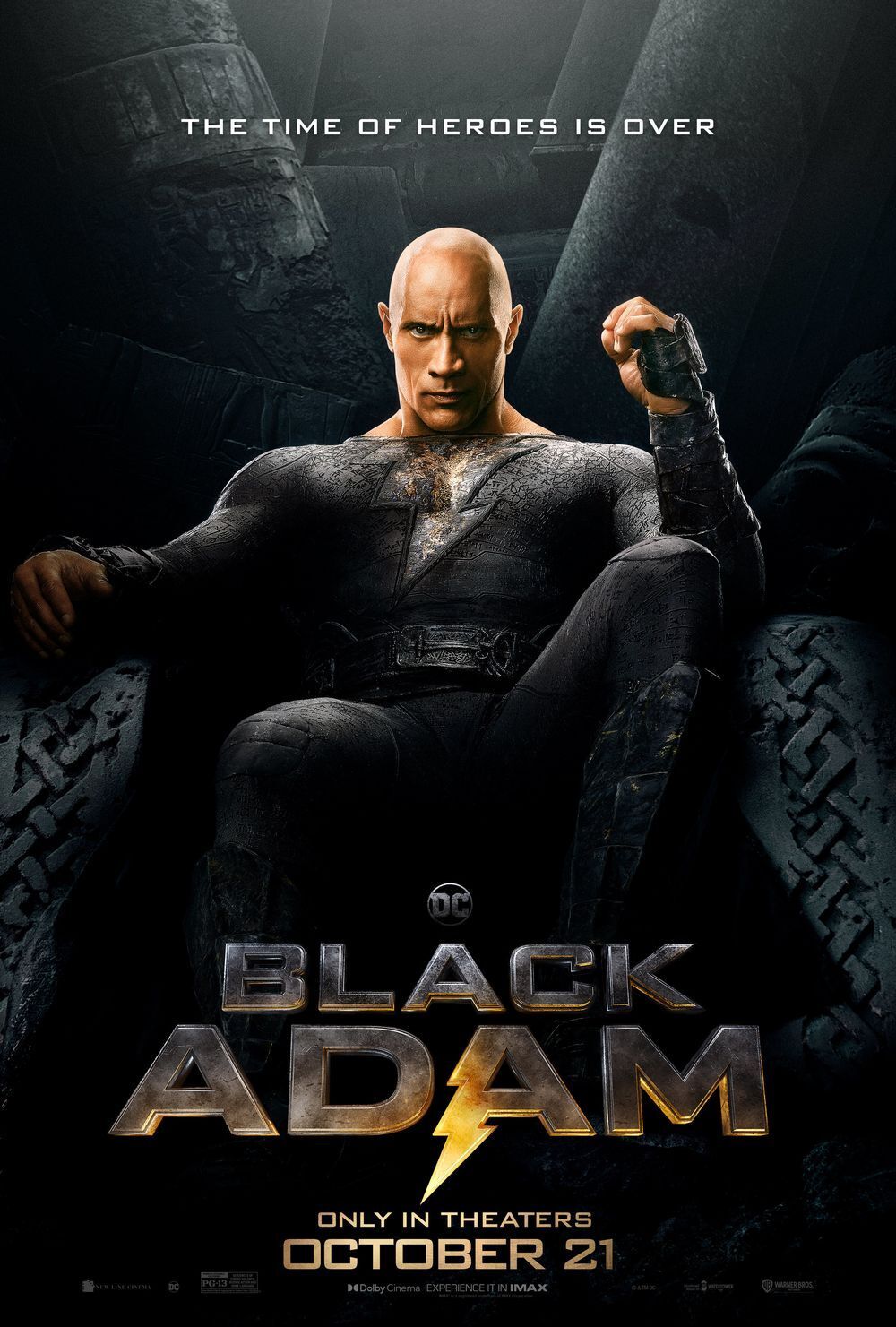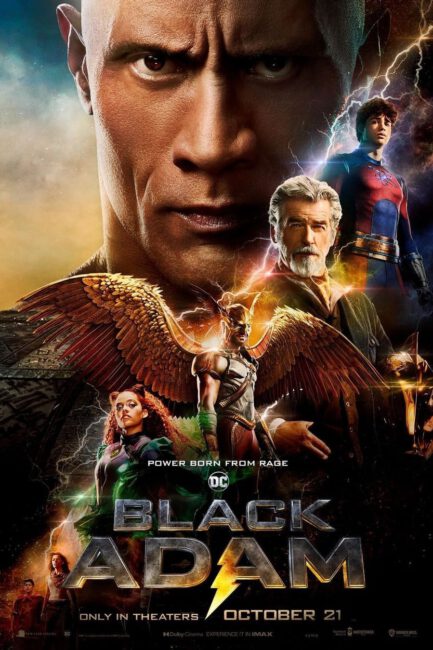Part of my DCEU Rewatch. First Watch? YES.
There will be spoilers …
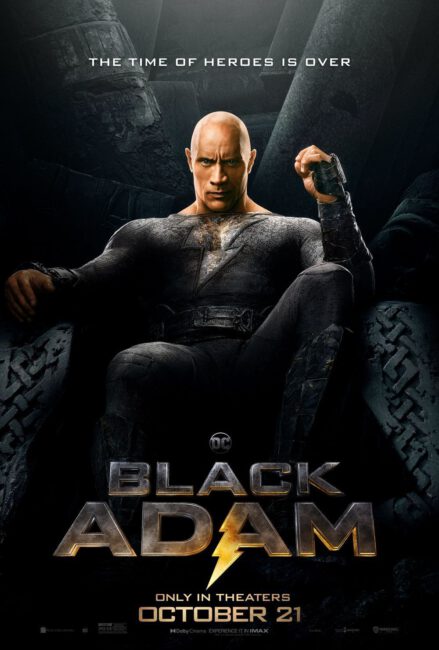
After its critical and box office drubbing, I was not holding out much hope for Black Adam. To my surprise, it’s actually a decently crafted super-hero flick, with some unique elements that make it not just another slog. It’s not the paragon of the genre, no matter how much Dwayne Johnson wants you to think so — there are some plot and characterization elements that are more than a bit goofy. But that said, there are far worse DCEU films (I know — I’ve watched several of them this past week).
The theme of being a hero vs. being an avenger (small A), or force of anger, or even just a protector, is centrally, though shallowly, addressed. Johnson, in the title role, sometimes comes across like David Bautista’s Drax — literal and violent in a way that’s meant to be endearing (and turns disturbing if you give it any thought) — but when he relaxes he — and the movie — are eventually able to more or less walk the fine line between serious issues and situational humor.
Some notes from the viewing:
¶ Ultimately, the question for the movie is going to be how well Dwayne Johnson does Black Adam. If this movie had never been made, fans would have debated the matter for decades.
Well, the movie was made, and the answer is: pretty darned well. Physically, of course, he’s perfect — big, bald, and brooding. Emotionally, the brooding part works, too, as well as the glower. He has some emotional scenes he carries off decently. This is not a King Lear star turn, but he filled what it was just fine.
(OTOH, we can debate whether his wrestling-style publicity-driving behavior — aggressive hyperbole about his future role in the DCEU — might have been one of the factors that turned audiences away from the movie, or, more importantly, turned the WB execs away.)
¶ Along those lines, the anti-hero thing is getting a bit tired, but Black Adam does provide us with a novel instance of it: a brutalized man, from a brutal culture, with the power to be brutal to the folk he thinks need brutalizing. I sort of got some flashes of Conan the Barbarian there, early on.
¶ While appropriate, it’s also kind of cool to see a movie like this set in a foreign country — and focused on its people — rather than another supers film centered on the US. That another country could have a history, could have patriots, could serve as something more than an exotic plot layover or a homeland for terrorists — is probably the most imaginative thing about the film.
That said, the treatment doesn’t get more than skin deep. While I’m a little glad that we didn’t get the usual gang of juntaists or dictators, saying that Kahndaq has been taken over by Intergang for the past several years isn’t telling us much (even for someone who recognizes the reference, as 95% of the fans won’t). Other than strip-mining for the hitherto unheard-of “Eternium” for their hi-tech weapons and transport, the question of what Intergang is doing there — how and why they are controlling the country, or who is even running the show — is handwaved aside, leaving those bad guys as merely often-faceless mooks for Black Adam to kill.
That speaks to a bigger flaw here: the idea that a nation could fundamentally exist, especially as a perpetually-conquered geographical realm, for five thousand years without serious cultural disruption or confusion of identity. To take a parallel example, Iraq doesn’t deem itself Assyria, or Babylon; it barely holds itself together as a nation, vs. regional ethnicities. The history and socio-politics of Kahndaq is (or should be) no different. We’re not just speaking out against colonialism, here; a lot of that “foreign” domination would be by regional neighbors.
Ditto with people tracing their heritage back 5,000 years. No matter what Ancestry.com tries to sell you, or how much your family talks about an object being “in the family for generations,” 5,000 years is really beyond the pale. Anyone who stepped forward claiming to be the last descendent of Nabonidus would be locked away.
That’s a problem brought over from the comics, though, not new with this movie. And, yes, it may seem weird to cavil at such a point in the face of a guy who can fly and punch people through stone walls. But romanticizing such things is culturally degrading in its own way, a subtle but real orientalism. Moon Knight had its own problems here, but still did a better job of focusing on the present world and its problems, not making everything dependent on the past.
¶ It’s brought up on a couple of early occasions that Black Adam is vulnerable to Eternium — what Intergang has been using (and even labeling!) in their new weapons. Weirdly enough, this basically gets dropped as a plot element (so to speak), even when Adam gets caught in the explosion of their fancy jet bikes.
¶ There are some odd (or at least noteworthy) narrative choices in the film. One is that the titular character is absent for a big chunk of the Fourth Act, after he surrenders to the JS and gets locked away under the Arctic Ocean. Such a powerful presence leaves a big gap — and that’s a bold move.
On the other hand, we have the narrative structure that Kahndaq is being controlled by Intergang (one in a list of five thousand years of conquerors, as discussed above), but we only ever see low-level mooks and mid-level fellow-traveler Ishmael; Intergang almost a McGuffin antagonist, there to provide victims to Black Adam and big explosions as their strip mining operations blow up real good. I read that there was originally an intent to include Bruno Mannheim as the head of Intergang; that might have been a distraction, but it might have lent a bit of focus to this aspect of things.
Note that it’s not that the Intergang thing is unbelievable in and of itself (glowy jet scooters aside). Read a bit about how the Wagner Group (yes, that Wagner Group) has been involved (or involved itself) in a number of African civil wars, mostly to literally take over extraction industries there for a tidy profit. The thing is that Intergang here has absolutely no personality. They operate checkpoints in “the city,” and strip mines in the desert, and that’s about it.
¶ On the other hand, there are two very neatly done twists. First, that the solitary named bad guy (Ishmael) actually wants to be killed by Adam (thus why he turns off the Eternium force field at the penultimate conflict) so that he can … get turned into Sabbac (which he figures out will happen in some unexplained fashion). It turns what looks like an early, almost-big-enough victory, into just a stepping stone for the final act. I know that I didn’t glance at the clock, but instead wondered, “Is this really how it ends, with the bad guys foiled, and Adam being sent into black ops exile?” They fooled me, and that’s a good thing.
Second, we have the unexpected twist in Teth-Adam’s backstory — and what he does about it. It’s quite nicely executed, and actually lends some character to the character. Having followed Black Adam as a character since DC pulled him out of just being a Captain Marvel/Shazam antagonist, I wasn’t surprised by it (variations have show up before), but the abrupt but believable shift in the history does good things to make Black Adam — if not more sympathetic, at least a bit more understandable as a person.
¶ I am amused to read that, for a movie that features (indeed, calls out) such a high body count, it originally garnered an “R” rating for it, and so had to be toned down — largely, I suspect, by simply not “showing” the deaths, just showing Black Adam tossing people high into the air, dropping them from great heights, or smokelessly electrocuting them.
I don’t know — turning (even marginally justified) mass murder into something of a bloodless joke is a bit disturbing. I mean, it was also disturbing in The Suicide Squad (2021), and even in the various Guardians of the Galaxy films, but there it worked. In those films, the question is, can someone who kills people (for fun, for sport, for money) also be a good person in some way, caring, self-sacrificing, even arguably heroic? Here, Black Adam is trying to establish who he is, for himself and his associates and his nation, and he seems happy to not be any of those positive things, as long as he can work out his anger.
I don’t know — it bears more consideration. Perhaps it’s simply that The Suicide Squad wasn’t afraid to lean into it — it accepted its “R” for “strong violence and gore” (among other things), rather than hiding the results of that strong violence by simply having Black Adam throw bad guys over the horizon.
¶ I will confess I watched this movie much more to see the Justice Society than to see Black Adam. And, remarkably enough, I was not disappointed.
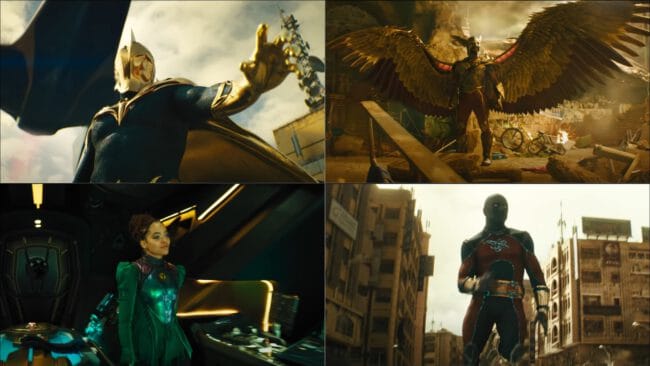
Well, disappointed a little. That their mission is to protect “global stability” is … in its own way, as amoral and anti-heroic as Black Adam, vows against killing aside. They represent a world order that seems accept Intergang controlling a country (or, since there’s been no independent Kahndaq for five thousand years, a region within some other country) and stripping it for resources — accepting enough that when someone pops up and potentially will be disrupting their operations, the US Government calls in some big guns to publicly knock that someone down.
The Justice Society are not the good guys here. That they get called out for that a bit by Adrianna was a good thing to see.
That illusion of moral high ground is further damaged by their being in bed with Amanda Waller (and dumping a prisoner off to a Task Force X black site). To date, we’ve only seen Waller running her “Suicide Squad.” Presumably, the JS doesn’t have bombs in their heads, which makes me wonder what the backstory is for these ostensible heroes. We never get much hint of it
In such a (literally) gritty environment, the cool Nth Metal (!) Hawk Jet (and its very silly launch sequence) feel quite out of place.
That said, I loved the characters. I could do without the Atom Smasher / Cyclone flirtation, but Pierce Brosnan’s Doctor Fate and Aldis Hodge’s Hawkman were wonderful, and quite in character. I am actually surprised we got to see as much of them, in and out of battle, as we did — though they all lacked much in the way of context (if only to provide contrast to Black Adam), and they all needed briefings on (a) de-escalating conflict, (b) how to minimize civilian casualties, and (c) the 1954 Hague Convention for the Protection of Cultural Property in the Event of Armed Conflict.
I mean, you only say “Kneel or Die” when you want to escalate conflict, right?
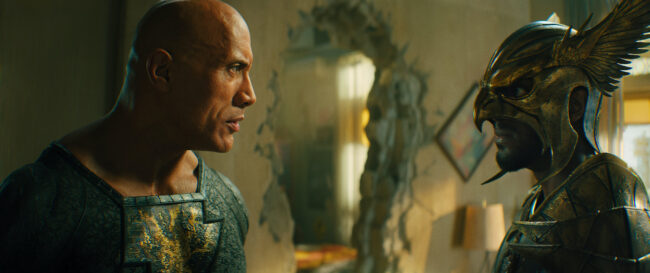
Damn. I really do want to know more about this group, because it seems under- and poorly staffed. Hawkman is the world’s worst choice of leader, given his clear anger management issues, Doctor Fate is too often checked out, and the only other two members (one of them brand new) are too young to be acting independently. Is the Justice Society just a public operation of whatever group Waller runs or is part of? An actual government-sponsored team to be sent in when covert wet-work is not preferred, but an overt statement of US policy is? That would be a very cool twist (and an inevitable conflict with the JL) that we will never, ever get to see.
¶ Adrianna sure seems to turn on (or at least get suspicious of) Black Adam pretty quickly, upon conversation with the JS. It felt like there was a scene or two missing there.
¶ I’m sure there was no winking message there when Black Adam, in beating up Hawkman in Amon’s room, pointedly demolished every DC comic book poster he had. (Eyeroll.)
On the other hand, it’s fascinating to learn that the very real heroes in the DC Universe have comic books (and comic book posters) of themselves.
¶ The Black Adam / Sabbac BBEG battle at the end is almost anticlimactic, given what’s come before. Still, it actually does a much better job — maybe because it is grounded in a realistic-looking setting — of feeling real, even with all the energy being thrown about and illusions being cast. Having watched a lot of BBEG battles, this one was one of the best.
That said, it there’s no real sense going into it who is better, or if the two SHAZAM figures are dead even. That lowers the tension a bit, especially with multiple heroes involved.
Nice twist on the vision that was fulfilled/averted/accommodated.
I guess it was nice that the civilians had something to do during that battle other than scream madly and flee down the streets — but the zombie battle felt a little bit silly.
¶ In keeping with the comics (well, some threads of them with this character over the past decade or two), Black Adam becomes, not a hero, not a ruler, but a protector of Kahndaq. Which is totally cool, totally needed, and I’d love to see that kind of model show up elsewhere in whatever the DC Universe looks like in the future.
¶ The mid-credits sequence … yeesh. I know the DCEU’s Amanda Waller doesn’t always use the best judgment, but she has three Justice Society people working for/alongside her that could tell her that approaching Black Adam with threats is SO counter-indicated.
Of course, she (through some unexplained means or another) demonstrates the power she claims to be able to wield. Also, of course, though we don’t see it, I can very easily see Adam punch Superman in the snoot a half-second after the credits continue rolling, because, again, Black Adam as a character is all about showing who’s dick is bigger if he thinks someone is challenging that point.
It’s all a moot point, of course. Black Adam was a cinematic dead end. Its mediocre financial performance — not really deserved, but Johnson’s ego-boosting hijinx around this, as well as fatigue over the known collapse of the DCEU — means we will not see a sequel to this, or see Black Adam show up elsewhere, and, most likely not any of the Justice Society members, either.
Which is a shame. As I said, I kind of liked this film. I can see coming back to watch it again in the future, too … even if it’s just a footnote in cinematic history.
Do you want to know more?
- This review, in a less expanded form (but still probably too long for what we’re actually talking about here), was previously posted on LetterBoxd.
- Black Adam (2022) – IMDb
- Black Adam (2022) — The Movie Database (TMDB)
- Black Adam (film) – Wikipedia
